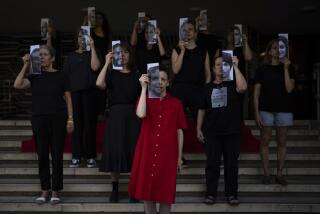Kidnapping of Egyptians Further Alarms Foreigners
- Share via
BAGHDAD — The foreign community’s fragile sense of security took another blow Friday as news spread of the latest kidnapping of foreigners in the Iraqi capital, another operation in an upscale neighborhood that was carried out in a matter of minutes and without gunfire.
The kidnapping late Thursday of two Egyptian telephone engineers was the third such well-organized abduction of foreigners in Baghdad this month. The fate of one British and two Italian hostages remained unknown.
Also Friday, in what military authorities called an insurgent attack, a rocket exploded on a busy street in the northern part of Baghdad, killing four people and injuring 15. A mortar round also landed near the Italian Embassy, injuring two people. The embassy has been a frequent target of insurgents because Italy is a member of the U.S.-led military force in Iraq.
In the latest kidnapping, about 10 p.m. Thursday, four armed men flashing fake company IDs entered a cellphone company office on the main commercial street of the Harithiya district, overpowered and tied up as many as six security guards, then dragged the two Egyptians out to a waiting BMW. They also stole the engineers’ car to assist their getaway.
Eight employees of the company, Iraqna, were kidnapped a day earlier on a road outside Baghdad, according to Associated Press.
The victims were four Egyptian engineers and four Iraqis, the wire service said.
Many of the scores of kidnappings of foreigners this year have been aimed at thwarting Iraq’s reconstruction. Iraqna, majority owned by Egypt’s wealthy Sawaris family, is Iraq’s first cellular phone company, established less than a year ago. Cellphones were banned under Saddam Hussein.
In its crisp planning and execution, the operation resembled two kidnappings of Westerners this month. First was the Sept. 7 abduction of Italian aid workers Simona Torretta and Simona Pari from their central Baghdad offices in broad daylight.
Last week, Briton Kenneth Bigley and Americans Eugene “Jack” Armstrong and Jack Hensley were kidnapped from their home in the city’s Mansour neighborhood.
Armstrong and Hensley were beheaded by the kidnappers this week. The captors also posted an Internet video of Bigley pleading for British Prime Minister Tony Blair to save his life by granting the kidnappers’ demand for the release of all imprisoned Iraqi women.
The kidnappers claim to be members of a group led by Jordanian extremist Abu Musab Zarqawi.
Sabah Kadhim, spokesman for the Iraqi Interior Ministry, said there were no solid developments in the case of the Italian women. A message posted this week on an Arabic Internet bulletin board, purportedly from the captors, claimed that they had been beheaded.
Italian officials treated the message skeptically, as did Kadhim, who said there had been equally dubious messages announcing their release.
Elsewhere in Iraq, U.S. military officials said they struck “a known terrorist meeting site in central Fallouja” early this morning and that “there were no innocent civilians reported in the immediate area at the time.”
Associated Press reported that hospital officials and witnesses in the city said at least eight people were killed and 15 wounded.
U.S.-led forces said Friday that they had fired artillery shells at an open field south of Fallouja, where 10 to 12 insurgents were training with rocket-propelled-grenade launchers and mortars, then called in airstrikes when the insurgents retreated to a cave.
There was no immediate report of casualties.
Polish-led troops in southern Iraq seized explosives and 320 large-caliber artillery shells and arrested 20 suspects Thursday.
From the pulpits of Baghdad mosques Friday, clerics denounced interim Prime Minister Iyad Allawi for shaking the hand of the Israeli foreign minister, Silvan Shalom, Thursday at the United Nations.
Special correspondents Saif Rasheed and Ammar Fadhil in Baghdad and Hameed Suleibi in Fallouja contributed to this report.
More to Read
Sign up for Essential California
The most important California stories and recommendations in your inbox every morning.
You may occasionally receive promotional content from the Los Angeles Times.










